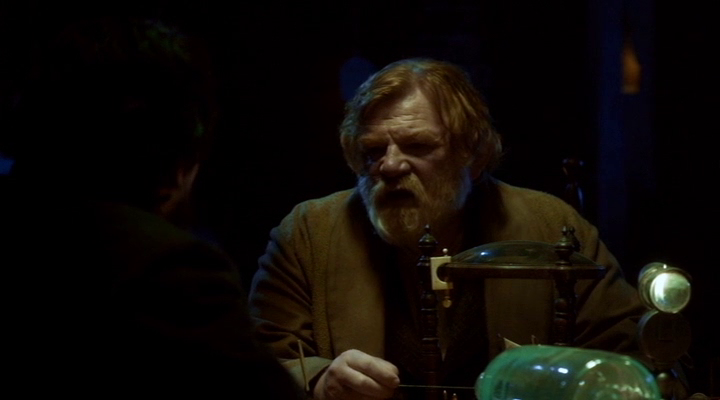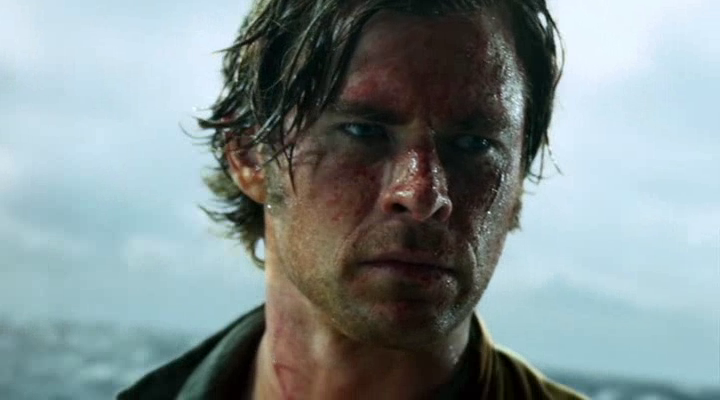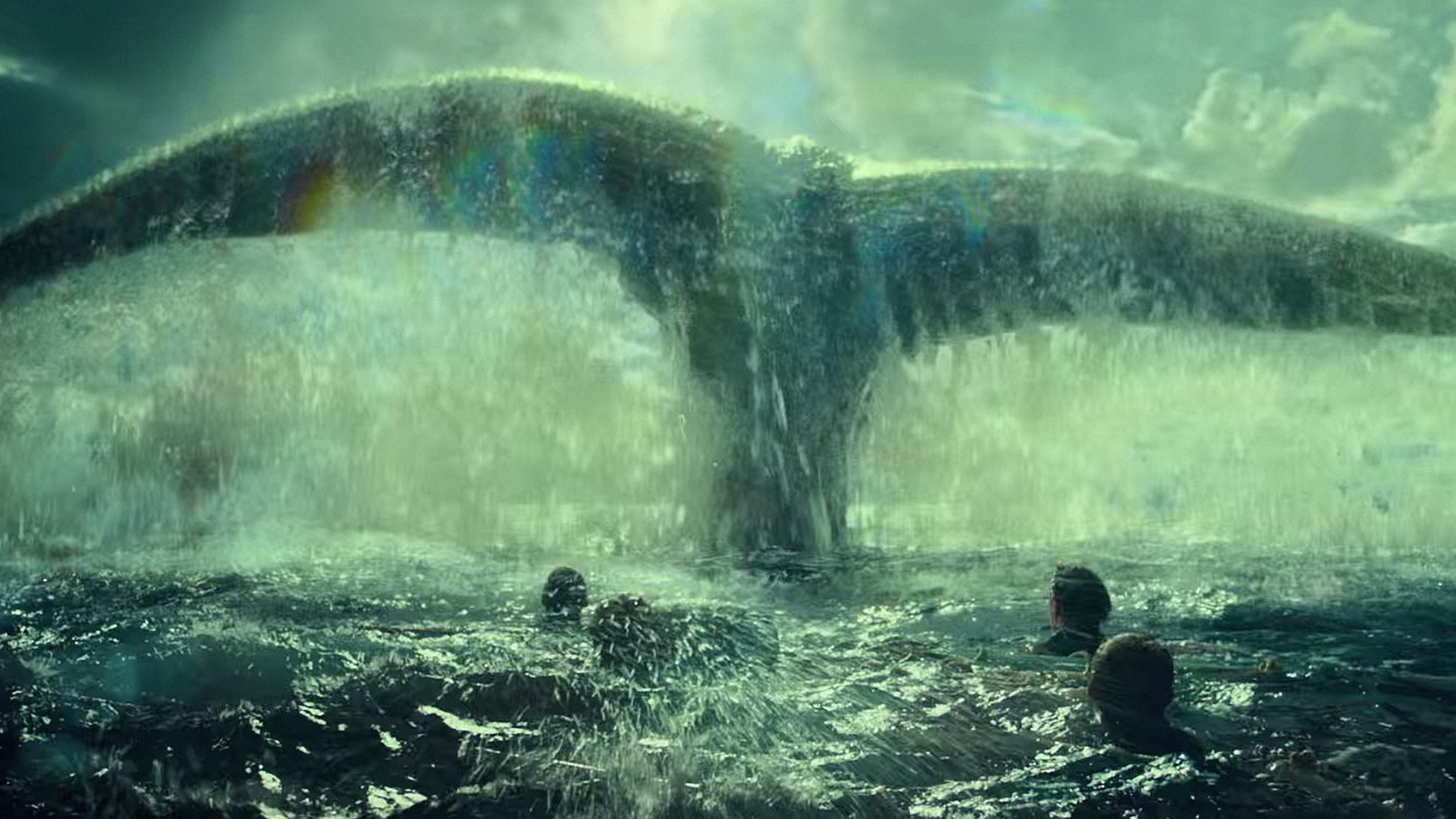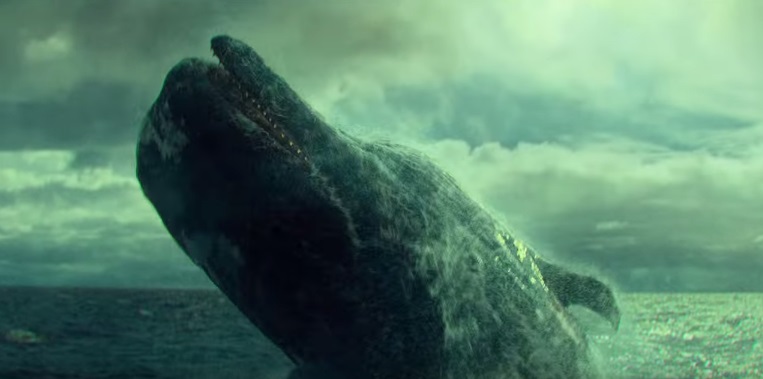Director Ron Howard decided to go with the unnecessary framing device for this movie of having Herman Melville (Ben Whishaw) interviewing Tom Nickerson (Brendan Gleeson), the only living survivor of the ill-fated whaling ship Essex, for the book that would one day become Moby Dick. After being cajoled to finally tell the “true story” of what went down on the last voyage of the Essex the movie jumps right into us seeing whaler supreme Owen Chase (Chris Hemsworth) meeting with the owners of the whaling company and the ship he thinks he is going to captain, but he’s told that he will actually only be First Mate on this voyage, despite their promises to the contrary, as they’d rather have someone with a good family name such as George Pollard (Benjamin Walker) to be captain. We then see Owen bidding a tearful farewell to his pregnant wife, promising to return as fast as human possible from this super dangerous job. Do you see the problem here? Narrator Tom Nickerson is in neither of these scenes, in fact the character of Nickerson barely makes an impact on the film, unless you count throwing up on Chris Hemsworth’s boots as an impact, so how could this guy even remotely be considered a reliable narrator?
Wednesday, December 30, 2015
In the Heart of the Sea (2015) - Review
This is not an adaptation of Herman Melville’s classic tale Moby Dick. This is an adaptation of the book that was based on the true events that inspired Herman Melville’s classic tale of Moby Dick. Got that? The book this movie is based on is Nathaniel Philbrick’s
non-fictional account of the sinking of the American whaling ship Essex
in 1820. So with Ron Howard at the helm we kind of get Backdraft meets Melville by way of Peter Weir’s Master and Commander: The Far Side of the World, with a dash of Spielberg’s Jaws.
Director Ron Howard decided to go with the unnecessary framing device for this movie of having Herman Melville (Ben Whishaw) interviewing Tom Nickerson (Brendan Gleeson), the only living survivor of the ill-fated whaling ship Essex, for the book that would one day become Moby Dick. After being cajoled to finally tell the “true story” of what went down on the last voyage of the Essex the movie jumps right into us seeing whaler supreme Owen Chase (Chris Hemsworth) meeting with the owners of the whaling company and the ship he thinks he is going to captain, but he’s told that he will actually only be First Mate on this voyage, despite their promises to the contrary, as they’d rather have someone with a good family name such as George Pollard (Benjamin Walker) to be captain. We then see Owen bidding a tearful farewell to his pregnant wife, promising to return as fast as human possible from this super dangerous job. Do you see the problem here? Narrator Tom Nickerson is in neither of these scenes, in fact the character of Nickerson barely makes an impact on the film, unless you count throwing up on Chris Hemsworth’s boots as an impact, so how could this guy even remotely be considered a reliable narrator?
Director Ron Howard decided to go with the unnecessary framing device for this movie of having Herman Melville (Ben Whishaw) interviewing Tom Nickerson (Brendan Gleeson), the only living survivor of the ill-fated whaling ship Essex, for the book that would one day become Moby Dick. After being cajoled to finally tell the “true story” of what went down on the last voyage of the Essex the movie jumps right into us seeing whaler supreme Owen Chase (Chris Hemsworth) meeting with the owners of the whaling company and the ship he thinks he is going to captain, but he’s told that he will actually only be First Mate on this voyage, despite their promises to the contrary, as they’d rather have someone with a good family name such as George Pollard (Benjamin Walker) to be captain. We then see Owen bidding a tearful farewell to his pregnant wife, promising to return as fast as human possible from this super dangerous job. Do you see the problem here? Narrator Tom Nickerson is in neither of these scenes, in fact the character of Nickerson barely makes an impact on the film, unless you count throwing up on Chris Hemsworth’s boots as an impact, so how could this guy even remotely be considered a reliable narrator?
Subscribe to:
Post Comments (Atom)






No comments:
Post a Comment